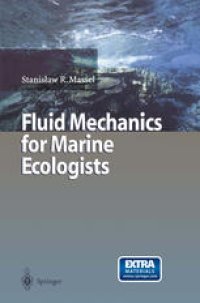
Ebook: Fluid Mechanics for Marine Ecologists
- Tags: Oceanography, Geoecology/Natural Processes, Nature Conservation, Fluid- and Aerodynamics, Ecology
- Year: 1999
- Publisher: Springer-Verlag Berlin Heidelberg
- Edition: 1
- Language: English
- pdf
The future quality of life on Earth fundamentally depends on trends in world climate. The oceans playa dominant role in regulating global climate by help ing to control greenhouse gases, global heat transfer and weather patterns. If we also consider the energy and other resources oceans offer, their essential importance to human existence become obvious. Ocean waters are in endless motions. Scales of these motions vary from micro-turbulence through to surface and internal waves, tides, and global currents of planetary dimensions. How ever, in each case the water motion satisfies the fundamental fluid mechanics and geophysical fluid mechanics principles. Oceans are not empty, but support a large variety of organisms and plants. Many of the basic attributes of life of these creatures raise such questions as: why are the ocean's living resources distributed as they are?; how can cyclical changes overthrow the system?; why do organisms have a particular size and shape?; how do they move and reproduce?; how do they capture food and many others. In the majority of situations, biological processes appear to be strongly influ enced by the physics, while the physical processes are largely independent of the biology. However, when we consider a time scale of thousands years, the feedback from biology to physics is not so simple. The present composition of the Earth's atmosphere and the present average temperature at the surface of the Earth have been strongly influenced by living organisms.
Content:
Front Matter....Pages i-xviii
Front Matter....Pages 1-1
Introducing Sea Water....Pages 3-16
Water at Rest and in Motion....Pages 17-76
Front Matter....Pages 77-77
An Introduction to Surface Waves....Pages 79-106
How to Determine Wave Parameters....Pages 107-154
Tides....Pages 155-182
Internal Waves....Pages 183-200
Ocean Currents....Pages 201-252
Transport in the Oceans and Coastal Zone....Pages 253-304
Experimental Methods in Fluid Mechanics....Pages 305-334
Front Matter....Pages 335-335
Mechanical Properties of Biological Materials....Pages 337-352
Locomotion of Marine Animals....Pages 353-376
Internal Flows in Marine Organisms....Pages 377-390
Transport and Mixing in Coastal Ecosystems....Pages 391-416
Tides and Waves on Vegetated Coasts....Pages 417-452
Vertical Structure of Ocean Waters and Biological Productivity....Pages 453-466
Back Matter....Pages 467-566
Content:
Front Matter....Pages i-xviii
Front Matter....Pages 1-1
Introducing Sea Water....Pages 3-16
Water at Rest and in Motion....Pages 17-76
Front Matter....Pages 77-77
An Introduction to Surface Waves....Pages 79-106
How to Determine Wave Parameters....Pages 107-154
Tides....Pages 155-182
Internal Waves....Pages 183-200
Ocean Currents....Pages 201-252
Transport in the Oceans and Coastal Zone....Pages 253-304
Experimental Methods in Fluid Mechanics....Pages 305-334
Front Matter....Pages 335-335
Mechanical Properties of Biological Materials....Pages 337-352
Locomotion of Marine Animals....Pages 353-376
Internal Flows in Marine Organisms....Pages 377-390
Transport and Mixing in Coastal Ecosystems....Pages 391-416
Tides and Waves on Vegetated Coasts....Pages 417-452
Vertical Structure of Ocean Waters and Biological Productivity....Pages 453-466
Back Matter....Pages 467-566
....